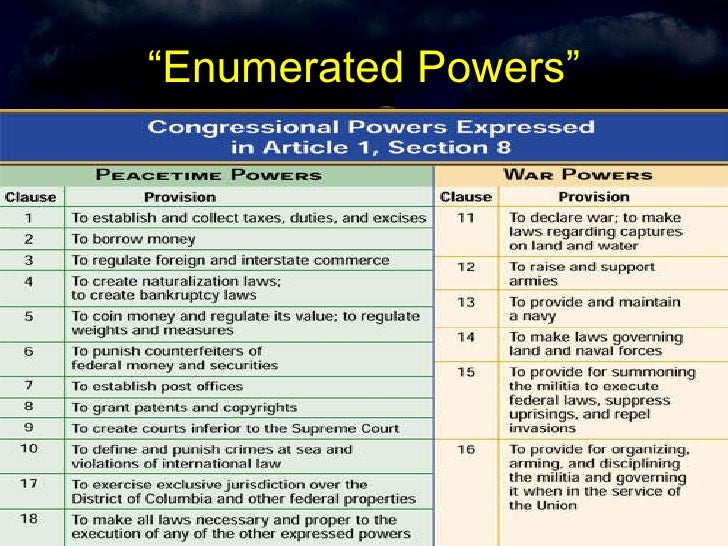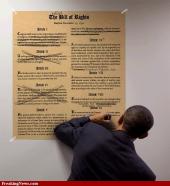In this interview from last March, I groused that the Supreme Court – largely thanks to statist Justices appointed by one of America’s worst presidents – basically decided, starting in the 1930s, that it would no longer be bound by the Constitution’s provisions that protect economic liberty.
I’m not a lawyer, much less an expert on the Constitution, but I know how to read.
![]() The Constitution very clearly is a document to constrain rather than enable government. It was designed to produce what I’ve referred to as Madisonian constitutionalism.
The Constitution very clearly is a document to constrain rather than enable government. It was designed to produce what I’ve referred to as Madisonian constitutionalism.
When Justices ignore their responsibility to protect our rights, however, they’re basically acting like this satirical image of President Obama.
Let’s look at two very tragic legal cases from that era.
Professor John McGinnis, writing for Law & Liberty, discusses the wretched Supreme Court case that undermined the Constitution’s Contract Clause.
…the Contract Clause…was the most litigated provision of the Federal Constitution in the 19th century, but today it has become a shadow of its former self because the Court has abandoned its original meaning. …The Contract Clause provides: “No State shall… pass any… Law impairing the Obligation of Contracts.” …in The Federalist, Madison argued that the Clause was a “bulwark in favor of… private rights.”![]() …It is designed to protect an important aspect of the rule of law: a prohibition on the government changing specific plans that autonomous individuals have made. …For the 19th and early 20th centuries, the Supreme Court was relatively faithful in interpreting the Clause. In Home Building & Loan Association v. Blaisdell, however, the Court departed from its role as a faithful agent of the Constitution. …influenced by the Depression and the growing discontent with the jurisprudence of substantive due process with which it confused the clear command of the Contract Clause, the Court upheld the law. It is true that times were hard, but as Justice George Sutherland’s dissent noted, legislation protecting debtors against creditors is passed precisely at such times, and yet such legislation was exactly the kind of evil which the Clause was designed to prohibit. The case is striking as an example of one of the most express rejections of originalism. Chief Justice Hughes stated explicitly that the Court was not bound by the original understanding of the Clause.
…It is designed to protect an important aspect of the rule of law: a prohibition on the government changing specific plans that autonomous individuals have made. …For the 19th and early 20th centuries, the Supreme Court was relatively faithful in interpreting the Clause. In Home Building & Loan Association v. Blaisdell, however, the Court departed from its role as a faithful agent of the Constitution. …influenced by the Depression and the growing discontent with the jurisprudence of substantive due process with which it confused the clear command of the Contract Clause, the Court upheld the law. It is true that times were hard, but as Justice George Sutherland’s dissent noted, legislation protecting debtors against creditors is passed precisely at such times, and yet such legislation was exactly the kind of evil which the Clause was designed to prohibit. The case is striking as an example of one of the most express rejections of originalism. Chief Justice Hughes stated explicitly that the Court was not bound by the original understanding of the Clause.
Writing for FEE, Professors Antony Davies and James Harrigan explain the terrible 1942 decision by the Supreme Court to remove any meaningful restriction on the power of the central government.
They start by pointing out that the 18th Amendment (imposing prohibition) was an example of how to expand the power of government in the proper way.
The Constitution creates a government of enumerated powers, which means the federal government is only authorized to do things that are specifically listed in the Constitution. And that list is relatively short. The list appears in Article One, Section Eight and enumerates the proper objects of congressional legislation.![]() …Consider the United States’ ill-advised flirtation with Prohibition—which was enacted almost exactly 100 years ago. Nowhere in the Article One, Section Eight powers does one see the authority to “ban the manufacture, transport, or sales of alcohol within the United States.” When Americans decided that they wanted a coast-to-coast ban on alcohol, they amended the Constitution to give the federal government this authority. Fourteen dry years later, Americans came to their senses and revoked this authority by amending the Constitution again.
…Consider the United States’ ill-advised flirtation with Prohibition—which was enacted almost exactly 100 years ago. Nowhere in the Article One, Section Eight powers does one see the authority to “ban the manufacture, transport, or sales of alcohol within the United States.” When Americans decided that they wanted a coast-to-coast ban on alcohol, they amended the Constitution to give the federal government this authority. Fourteen dry years later, Americans came to their senses and revoked this authority by amending the Constitution again.
Alcohol prohibition was a mistake, of course, just like today’s drug prohibition, and the American people went through the proper process of adopting the 21st Amendment (to repeal the 18th Amendment).
Davies and Harrigan then explain that it was about that time that the Supreme Court decided that it would no longer uphold the Constitution’s restrictions on the powers of the central government.
As of 1933, when the 21st Amendment was ratified, Americans still had a constitutionally limited federal government and what Justice Louis Brandeis famously called “laboratories of democracy” in the states. …But who ended up being tasked with deciding what Article One, Section Eight actually meant? Herein lies the wrinkle that enables all manner of constitutional mischief in the United States. The institution that ended up deciding what the federal government is empowered to do is itself a branch of the federal government. And it should come as no surprise that when push comes to shove, the Supreme Court routinely finds in favor of empowering the federal government.
One of the most horrifying examples of judicial failure occurred in 1942.
In 1942, the Supreme Court decided a case, Wickard v. Filburn, in which farmer Roscoe Filburn ran afoul of a federal law that limited how much wheat he was allowed to grow. …A careful reader might, and should, ask where the federal government’s right to legislate the wheat market is to be found—because the word “wheat” is nowhere to be found in the Constitution. …The Agricultural Adjustment Act of 1938 put an upper limit on how much wheat farmers were allowed to grow, which would serve to keep prices high by limiting supply. Roscoe Filburn had grown 12 more acres of wheat than the law allowed. But not only did he not sell the excess wheat outside of his home state, but he also didn’t sell it at all. He used the wheat from those 12 acres to feed his cattle. …yet the Supreme Court found (unanimously) that because Congress had the authority to regulate interstate commerce, Congress also had the authority to prohibit Filburn from growing those 12 acres of wheat for his own use. …Filburn’s non-commercial activity was, according to the Supreme Court, interstate commerce. …Filburn’s non-commercial activity was, according to the Supreme Court, interstate commerce.
And here’s the result.
A century ago, we amended the Constitution when we wanted the federal government to exercise a new authority—that of banning alcohol. Today, we allow Congress to exercise almost any authority it likes. …We have progressed so far down the path of reinterpreting the Constitution as a document that empowers government, rather than one that limits it… The sad result has been a government nearly limitless in its power.
By the way, the Obamacare case may be as odious as Wickard v. Filburn since it marked another unfortunate expansion of Washington’s ability to control our lives, in violation of the clear language in Article 1, Section 8.
![]()
Though I don’t want to be too glum. The good news is that the Supreme Court occasionally does defend economic liberty, as the Wall Street Journal recently opined.
One goal of the U.S. Constitution was to form a union that allowed interstate commerce unencumbered by state protectionism. The Supreme Court reinforced that principle on Wednesday by striking down a two-year residency requirement to get a liquor license in Tennessee. ![]() …a business lobby known as Tennessee Wine and Spirits Retailers Association argued that the 21st Amendment that repealed Prohibition also gave the states broad authority to regulate alcohol. The association knows that if people can move to a state and open up liquor stores, it means more potential competition for those who already have licenses. The law is commercial protectionism and thus violates the Constitution’s Commerce Clause, the High Court ruled in Tennessee Wine and Spirits Retailers Assn. v. Thomas. “Because Tennessee’s 2-year residency requirement for retail license applicants blatantly favors the State’s residents and has little relationship to public health and safety, it is unconstitutional,” wrote Justice Samuel Alito for a 7-2 majority… the 21st Amendment doesn’t override the rest of the Constitution’s principles. As recently as 2005 (Granholm v. Heald), the Court ruled that New York state couldn’t discriminate against out-of-state wineries.
…a business lobby known as Tennessee Wine and Spirits Retailers Association argued that the 21st Amendment that repealed Prohibition also gave the states broad authority to regulate alcohol. The association knows that if people can move to a state and open up liquor stores, it means more potential competition for those who already have licenses. The law is commercial protectionism and thus violates the Constitution’s Commerce Clause, the High Court ruled in Tennessee Wine and Spirits Retailers Assn. v. Thomas. “Because Tennessee’s 2-year residency requirement for retail license applicants blatantly favors the State’s residents and has little relationship to public health and safety, it is unconstitutional,” wrote Justice Samuel Alito for a 7-2 majority… the 21st Amendment doesn’t override the rest of the Constitution’s principles. As recently as 2005 (Granholm v. Heald), the Court ruled that New York state couldn’t discriminate against out-of-state wineries.
Some judges resent any protections against government power.
In an article for Reason, Damon Root properly castigates a judge for objecting to the economic liberties guaranteed by the 14th Amendment.
Does the U.S. Constitution protect economic liberty, such as the right to work in an occupation of one’s choosing free from unreasonable government regulation? Pennsylvania Supreme Court Justice David Wecht thinks not. …in Ladd v. Real Estate Commission of the Commonwealth of Pennsylvania, Wecht faulted his colleagues in the majority for their “judicial intrusion into the realm of legislative value judgments” after that court allowed a legal challenge to proceed against a state occupational licensing scheme.![]() “I cannot endorse a constitutional standard that encourages courts,” he declared, “to second-guess the wisdom, need, or appropriateness” of duly enacted economic regulations. …”For many years, and under the pretext of protecting ‘economic liberty’ and ‘freedom of contract,’ the Supreme Court routinely struck down laws that a majority of the Court deemed unwise or improvident,” Wecht wrote of Lochner and several related cases. …I would encourage Justice Wecht to read some more legal history. …Rep. John Bingham (R–Ohio)…served as the principal author of Section One of the 14th Amendment… As Bingham told the House of Representatives, “the provisions of the Constitution guaranteeing rights, privileges, and immunities” includes “the constitutional liberty…to work in an honest calling and contribute by your toil in some sort to the support of yourself, to the support of your fellow men, and to be secure in the enjoyment of the fruits of your toil.” …even those who opposed the passage of the 14th Amendment agreed that it was designed to protect economic liberty from overreaching state regulation… The “right to contract” was of course later secured by the Supreme Court in Lochner.
“I cannot endorse a constitutional standard that encourages courts,” he declared, “to second-guess the wisdom, need, or appropriateness” of duly enacted economic regulations. …”For many years, and under the pretext of protecting ‘economic liberty’ and ‘freedom of contract,’ the Supreme Court routinely struck down laws that a majority of the Court deemed unwise or improvident,” Wecht wrote of Lochner and several related cases. …I would encourage Justice Wecht to read some more legal history. …Rep. John Bingham (R–Ohio)…served as the principal author of Section One of the 14th Amendment… As Bingham told the House of Representatives, “the provisions of the Constitution guaranteeing rights, privileges, and immunities” includes “the constitutional liberty…to work in an honest calling and contribute by your toil in some sort to the support of yourself, to the support of your fellow men, and to be secure in the enjoyment of the fruits of your toil.” …even those who opposed the passage of the 14th Amendment agreed that it was designed to protect economic liberty from overreaching state regulation… The “right to contract” was of course later secured by the Supreme Court in Lochner.
Let’s close by detouring into the world of fantasy and contemplating how we should amend the Constitution today?
Rory Magraf lists five ideas in a piece for the Foundation for Economic Education, one of which I find especially tempting.
…the conversation always gets the cerebral juices flowing for legal enthusiasts; the idea of amending ![]() the US Constitution, something done only twenty-seven times in history, is about as close as one will get to actually sitting among the Founders in Philadelphia. With that in mind, here are some ideas.
the US Constitution, something done only twenty-seven times in history, is about as close as one will get to actually sitting among the Founders in Philadelphia. With that in mind, here are some ideas.
The Sixteenth Amendment to the Constitution of the United States is hereby repealed.
In short, abolish the income tax. This is usually a crowd-pleaser among libertarians and probably a handful of Republicans during an election year, but it is also a bit of a challenge, on the same level as chasing the moon. Still, it would be worthwhile to have the conversation.
Since I’m definitely not a fan of the income tax, I certainly endorse this notion.
However, I think we would need much stronger language. The key 1895 case that struck down the income tax was decided by a the narrow margin of 5-4, and that was back when Justices presumably cared more about the Constitution.
![]() I fear that a similar case today would not lead to the right result (which is one of the reasons I’m skeptical of a national sales tax).
I fear that a similar case today would not lead to the right result (which is one of the reasons I’m skeptical of a national sales tax).
In any event, the federal government’s broad power to tax does not translate into a broad power to spend. At least if we care about the Constitution.
And that means much of the federal government is (or, to be more precise, should be) unconsitutional.
P.S. Here’s some of what Thomas Sowell wrote about Wickard v Filburn.
P.P.S. Here’s some of what Walter Williams wrote about the Constitution’s limits of Washington.
P.P.P.S. If you want to read more, the Constitution was designed to protect against majoritarianism and to ensure “negative liberty.”
P.P.P.P.S. Readers may also be interested in this discussion of whether libertarians should prefer Hamilton or Jefferson.
my heroes were JFK, RFK and MLK, which furthered my anti-gun sentiments. …I thought the Second Amendment was not relevant to our modern-day society and it should be repealed. …In 2012 I tweeted: “@BarackObama please repeal the 2nd amendment and stop the @nra.” …I was a lifelong Democrat. In the 2016 presidential debates I watched…Hillary Clinton… I voted for her. …I was a little turned off by…the NRA.















































































